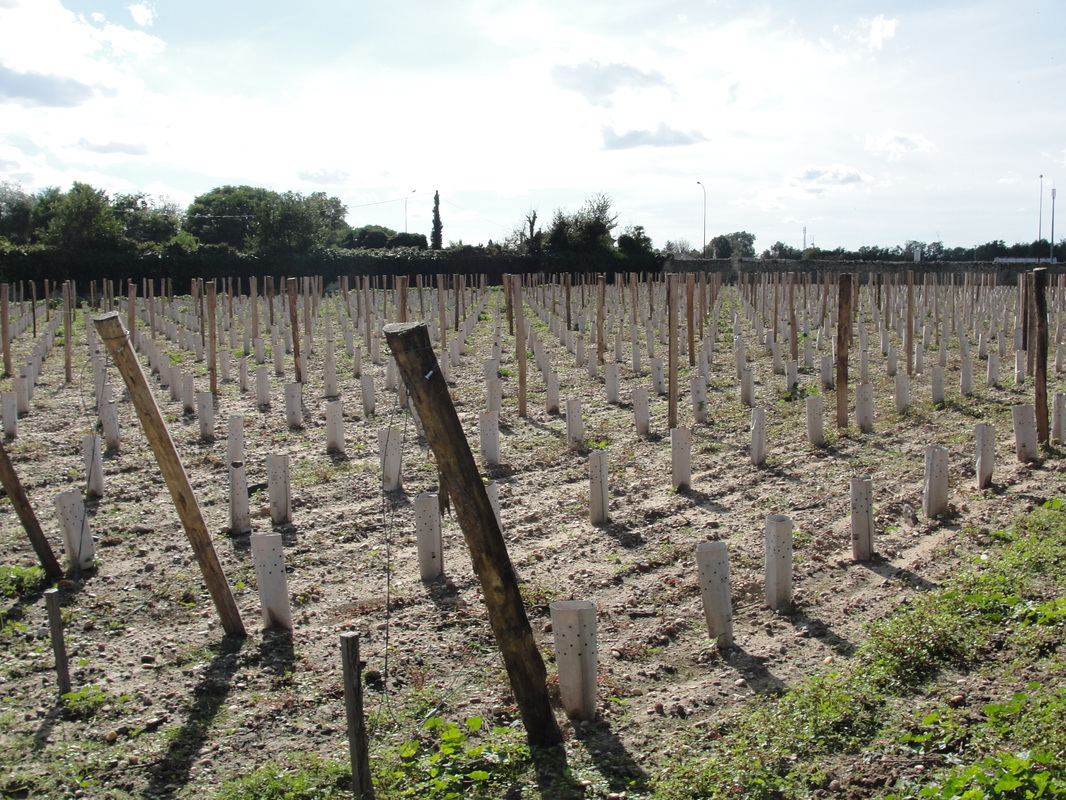It doesn't look like much, does it? A bunch of posts and a bit of plant rubble.
It is common knowledge that fine wine undergoes an aging process, but I didn't know until my family and I visited several vineyards in Graves, France, that the plants themselves must also reach maturity.
How long does it take? According to the master of this vineyard in Graves, France, it will take ten or more years for these vines to resemble the ones below. A whole decade? Just to start producing enough grapes for wine? Now granted, once the vines begin producing, they will continue to bear fruit for well over a decade, provided that they are well-tended to and the conditions of the soil and weather patterns are conducive to the grapes' development.
My experience in the vineyard caused me to rethink what Jesus had to say about the vine and the branches.
"I am the true vine, and my Father is the vinedresser. Every branch in me that does not bear fruit he takes away, and every branch that does bear fruit he prunes, that it may bear more fruit. Already you are clean because of the word that I have spoken to you. Abide in me, and I in you. As the branch cannot bear fruit by itself, unless it abides in the vine, neither can you, unless you abide in me. I am the vine; you are the branches. Whoever abides in me and I in him, he it is that bears much fruit, for apart from me you can do nothing." – John 15:1-5
As branches on Jesus' vine, we are dependent upon Him to bear fruit. I cannot bear fruit on my own anymore than a branch of an apple tree can produce an apple when it has been broken off the tree. I am completely dependent on the Gospel of Jesus Christ and the pruning and care of God the Father, the vinedresser, to grow. Apart from Him, I can do nothing.
I have no control of the process either. I can't fast-forward through the years required to grow. It is in God's timing.
The pressure is also off of me. No amount of spiritual discipline is going to expedite growth. All I can do is abide. It is also not dependent on me to make others bear fruit either, for it is God's vineyard. He knows exactly what each branch needs and tends to each one. I can't even come close to his knowledge and care.
So how will anyone know that I am abiding in Christ? By the God-produced fruit in me.
"You will recognize them by their fruits. Are grapes gathered from thornbushes, or figs from thistles?" – Matthew 7:16
The French school of wine-producing is also unique in that they use terroir – that is a sense of place that includes all conditions including geography, geology and climate. Each terroir dictates what variety of grape will best grow there. A vinedresser can't decide one year to grow one kind of grape and try a different one the next year.
This concept of terroir influences how wines our named. All of France is divided in to appellations, literally callings. The names of French wines come from where the vineyard is located. The wine of each region tastes different because of where it was grown.
As Christians, we bear the name of our vine, Jesus Christ. As His strength is manifest in us, we bear fruit – fruit that looks, smells and tastes like the life-giving hope we have in Him. What a privilege it is to bear His name!
 Powerless. This is what I felt like as a woman in Morocco.
Don't get me wrong. Morocco is a beautiful, incredible country. I was blown away by breathtaking sights – the Atlas Mountains, ancient cities, endless rolling sand dunes.
My trip with my friend Alyssa was my first taste of life in a non-Western, Muslim-dominant culture. Unintentionally, we also arrived near the end of Ramadan.
Immediately I noticed 98 percent of workers were men, and 98 percent of women had covered heads (the best was the woman with a burqa riding a motorcycle...that's talent!).
We immediately fell prey to one of the many "helpful" men, who called out to us and "made us" accept their help. When the young man asked us for money for his help (he led us around the labyrinth of the Marrakesh medina) to make sure we would be dependent on him, I told him we had nothing to offer him. But my word meant nothing. Even when I chewed him out in French (a first for me) and offered him a coin that Alyssa had, he continued to yell and bang on the door. Only the guest house owner (a man) was able to make him leave.
On the streets, we would get hassled and cat-called. That is, unless a man was with us. Silence.
When we got bedbugs, I brought Exhibit A (the bedbug I captured in my sleep) and prepared a beautiful presentation with identical verified bedbug pictures that I found on the internet. It didn't matter. I was told that the bug was just a mosquito that flew in through the window.
As a result of the bedbugs, we bought Moroccan clothing. The shop owner was happy to show us all his kaftans and offer us a great price. However, when I was ready to pay, the price rose by about 30 percent. I expressed my displeasure and stated the price he had quoted.
Just then, our bus driver (a man) who was also in the shop, began yammering at the shop owner in Berber. I couldn't understand what they were saying, but after observing disgruntled and concessionary body language, it was clear that the shop owner had given in. The price was lowered back to the original, not just for me, but also for Alyssa. Justice.
My experiences in Morocco showed me just how much I am in need of an advocate; someone who can intercede and bring justice. In Western societies, there isn't much that I can't do as a woman. I am independent. But I realize that in other cultures and also biblically, I need help.
In the Bible, there were high priests who interceded for the people, so that they would be able to approach God without fear of God's wrath for their sin. Now, there aren't need for for additional high priests, as Jesus serves as the ultimate high priest.
Now there have been many of those priests, since death prevented them from continuing in office; but because Jesus lives forever, he has a permanent priesthood. Therefore he is able to save completely those who come to God through him, because he always lives to intercede for them.
Such a high priest truly meets our need—one who is holy, blameless, pure, set apart from sinners, exalted above the heavens. Unlike the other high priests, he does not need to offer sacrifices day after day, first for his own sins, and then for the sins of the people. He sacrificed for their sins once for all when he offered himself. For the law appoints as high priests men in all their weakness; but the oath, which came after the law, appointed the Son, who has been made perfect forever (Hebrews 7:23-28)
What a comfort it is to know that I have Jesus who lives to intercede for me and all believers. That in spite of my weakness (in this case, sin), I am saved and thus stand justified before God because of the "once-for-all" work of Jesus on the cross.
 Give God your best. This is perhaps one of the slogans of the church. But do you know that Jesus Christ also died for your worst? For your failures, for your unmet needs, for your pain, for the lies that you've believed so long that they have become your identity.
"But he [Jesus Christ] was pierced for our transgressions; he was crushed for our iniquities; the punishment that brought us peace was on him, and by his wounds we are healed." – Isaiah 53:5
Jesus suffered so that we would have peace and healing. He served the sentence that our sin merits.
Just imagine that you were a convicted, hardened criminal. You were sentenced to the death penalty. But instead of dying, an innocent citizen who had do no wrong offers to die in your place. You try to say "no," but he insists, saying that he loves you and wants to give you a second chance to live. You can't refuse.
With the wonders of plastic surgery, you change places. He is made to look exactly like you, and everyone thinks he is the guilty one. That he has committed heinous crimes. His life is misery, and then he dies while you go free to live a new life.
Everything goes alright for a little while. You can't quite believe that you have liberty, and you have a new zeal for life. Then you are overwhelmed by how bad you are, and you start destroying yourself. You mortify your body and even start contacting executioners. You wonder how hard it would be to build a guillotine in your backyard. Suffering is what you deserve, you tell yourself.
Can you imagine how the person who died in your place would feel, watching you suffer unnecessarily? It would be like a slap in the face for what he had done for you. He died so that you wouldn't have to. He suffered, so that you could start fresh. Justice had already been satisfied. You can't take back what he did for you.
I don't know about you, but I am really good at living in guilt, thinking I need to hold onto my worst. In fact, sometimes, I don't want to even acknowledge pain and suffering in my life. It is easier to minimize or ignore it. But in doing so, I am negating Jesus Christ's act of love on the cross. I am withholding the joy he deserves. The reward he earned by suffering in my place. And I am missing out on the peace and healing that he offers.
Will you believe that God wants you to bring out your worst? To hand it over instead of being crushed under the weight. We'll never be able to give God our best if we won't first let him take our worst.
 "I quit."
Those of you who know me well know that those words don't often come out of my mouth together. Achievement fuels me. My goals are always before me. I tend to believe that with enough hard work, anything can be accomplished. Once I attain a goal, I am running full speed ahead to the next goal.
In some ways, I am never satisfied. There is always a better way, always room for improvement. It is never finished.
"It is finished." These were Jesus last words before he would die and days later be resurrected. What was finished? In brief, everything Jesus needed to accomplish on our behalf – enduring the agony of our sin and the resulting absence of God's presence, so we would never have to again. However, many Christians (myself included) tend to live as if Jesus forgot to dot a few "i"s and cross a few "t"s. In all of our efforts to look good and have everything together spiritually, our lives are negating Jesus' finished work. In effect, we become the object of our own faith. What does this have to do with embracing and being embraced by Jesus Christ (where I left you at the end of Part I)? Everything. When I was a little girl, the moment my dad walked in the door from work, I was lined up at the end of the entryway ready to run and leap into his arms. I never worried about whether he would catch me or not. I know my daddy was strong enough to hold me and the few joyful moments I would spend in his arms would reassure me of my father's love for me. When we embrace someone, we are also being embraced. And since we know that God is much grander than we are, this embrace is more about being taken up in His arms and resting in Him. Most parents say that their love for their children is immediate. They don't wait for their infants to prove themselves worthy of being loved. They love their children because they belong to them.
In the same way, I (and all who have been claimed as God's children) can rest in our identity in Jesus Christ, the one who has finished what we could not.
So I quit. No more striving. Anything I am doing to prove myself is worthless and, actually, quite disgusting. Because of who I am in Christ and what he has finished on my behalf, I am free to just be.
Consequently, I am practicing the presence of God and transformationally his love releases me to let go of striving. My most recent release was marathon training. I have run one marathon, and I learned so much about perseverance and dependence on God for strength. I wanted to run a second marathon, but one day in the midst of a run, I couldn't go on anymore (granted it was over 90 degrees out). I prayed a half-surrendered prayer, telling God he could stop me if he wanted to (but really, I didn't want him to).
I kept running, thinking I was ok but knowing I wasn't. Deep down, in spite of all my spiritualizing of the race, my real motivation ended in pride. I already have a finisher's medal. There is nothing left to prove.
Once I was convicted that I probably shouldn't keep going (a month later), God took it away. My medical certificate was rejected for not saying "marathon in competition" (mine only said "marathon") and not having the stamp of my doctor (doctors in the States don't have stamps).
Now my goal is to run the race of faith, running toward my savior Jesus who loves me, who has accomplished everything that matters.
"Therefore, since we are surrounded by such a great cloud of witnesses, let us throw off everything that hinders and the sin that so easily entangles. And let us run with perseverance the race marked out for us, fixing our eyes on Jesus, the pioneer and perfecter of faith. For the joy set before him he endured the cross, scorning its shame, and sat down at the right hand of the throne of God. Consider him who endured such opposition from sinners, so that you will not grow weary and lose heart." – Hebrews 12:1b-3
Part III will focus on practicing the presence of Christ and what it means to enter His rest. Until then, I urge you to give up and get going toward Jesus.
 Photo credit: Robert Lawton Photo credit: Robert Lawton Open caskets terrify me. The first one I ever saw was at the funeral of a toddler I babysat for who died suddenly of meningitis. The two-year-old lying in the coffin looked a small child sleeping from a far. When I came closer though, I could see the pasty make-up covering the lifeless face. The bed-jumping, song-singing, wiggling little boy was gone.
The second open casket was the visitation before my grandma's funeral. But it wasn't my grandma I visited. I visited a body, wearing my grandma's clothes, made to look as though she was alive. I don't know what it was about the corpse, but none of us in the family felt like it was her. Maybe it was that she wasn't wearing her glasses. Maybe it was that death had taken the puffiness out of her cheeks. Whatever it was, in that moment, I knew that, while my grandmother's body was still on earth, her spirit had departed. She would never hug me or squeeze my hand like the last time I had seen her alive.
Are you looking alive or fully alive? This was a question posed by pastor and author Alan Kraft at the ReachGlobal Europe conference I attended in Slovenia last month. "Look alive!" is a "cheer" sometimes heard from the stands when the home team is being crushed by the opponent. Often times, ministry teams have the same attitude when morale is down. It's as if by staying busy, we think we can convince ourselves and those around us, that we're doing okay.
However, just as no beautician can fully disguise death, no amount of trying, no amount of good works, no amount of good intentions, can make us fully alive in Christ. In fact, by trying harder, we are putting our confidence in our own ability, in our own flesh and effort, instead of the finished work of Jesus Christ through his death and resurrection. We are in essence believing that we can somehow make ourselves more acceptable to God.
Take a look at The Message paraphrase of Paul's letter to the Philippians, chapter 3:2-9 (emphasis mine):
"Steer clear of the barking dogs, those religious busybodies, all bark and no bite. All they’re interested in is appearances -- knife-happy circumcisers, I call them. The real believers are the ones the Spirit of God leads to work away at this ministry, filling the air with Christ’s praise as we do it. We couldn’t carry this off by our own efforts, and we know it -- even though we can list what many might think are impressive credentials. You know my pedigree: a legitimate birth, circumcised on the eighth day; an Israelite from the elite tribe of Benjamin; a strict and devout adherent to God’s law; a fiery defender of the purity of my religion, even to the point of persecuting the church; a meticulous observer of everything set down in God’s law Book.
The very credentials these people are waving around as something special, I’m tearing up and throwing out with the trash—along with everything else I used to take credit for. And why? Because of Christ. Yes, all the things I once thought were so important are gone from my life. Compared to the high privilege of knowing Christ Jesus as my Master, firsthand, everything I once thought I had going for me is insignificant—dog dung. I’ve dumped it all in the trash so that I could embrace Christ and be embraced by him. I didn’t want some petty, inferior brand of righteousness that comes from keeping a list of rules when I could get the robust kind that comes from trusting Christ--God’s righteousness."
Paul had ever reason to put confidence in his credentials. Yet he considers it all "dog dung" (some might choose an even more "choice" word). Why? Because God's righteousness is so much better. If this were a blind taste test, brand A has nothing on the surpassing flavor of brand B. There is no competition.
All of us at the conference were given a sheet of toilet paper. We were told to write anything and everything on it that was giving us a false sense of spiritual health. We wrote down the behaviors, beliefs and attitudes that we had embraced in our efforts to make sure God still loved us. The next time we had the urge "to go," we were to let our list go with it, down the tubes of the toilet.
It's one thing to flush our own righteousness, but how do we even begin to "embrace Christ and be embraced by him?" In case you are already overwhelmed by the length of this blog post, reflections this answer will come in part two. In the meantime, I urge you to make your own TP list. What are you doing to look alive?
|






 RSS Feed
RSS Feed